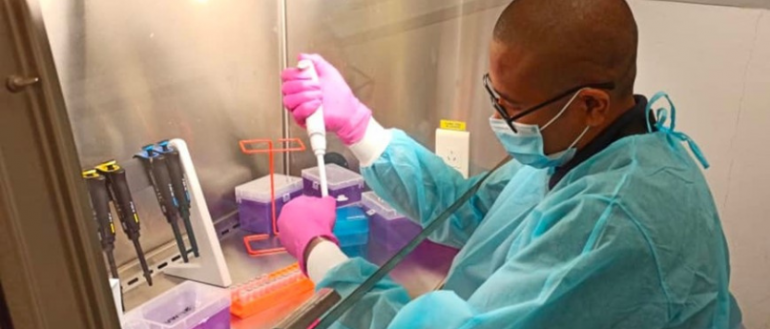The rapid expansion of Timor-Leste’s laboratory abilities during the COVID-19 pandemic has better prepared the country to respond to future infectious disease outbreaks.
A collaboration between Timor-Leste Ministry of Health (MoH) and Menzies School of Health Research (Menzies), supported by the Australian Government, means the country is now equipped with more laboratory resources and a trained workforce. These improvements can help Timor-Leste respond to other prevalent infectious diseases such as malaria, tuberculosis and HIV.
A new viewpoint paper published in The Lancet Regional Health – South East Asia, highlights how international partners supported Timor-Leste to enhance its diagnostic testing ability during the pandemic. This saw more than 200,000 COVID-19 tests completed and over 22,500 positive cases accurately detected during the pandemic, up until February 2022.
Menzies’s Timor-Leste microbiologist and lead author, Nevio Sarmento, said expanding the capacity of the National Health Laboratory – Molecular Diagnostic Laboratory (NHL-MDL) to test for COVID-19 was a crucial component of Timor-Leste’s pandemic response.
“Menzies worked in partnership with the NHL-MDL to procure diagnostic testing equipment and resources, expand laboratory capacity as well as rapidly upskill scientists to perform testing,” said Mr Sarmento.
“These steps were critical to enhance testing in Dili and to implement satellite testing centres across Timor-Leste.
“At the pandemic’s peak, Menzies supported the NHL-MDL to process 2,000 tests a day. This wide-scale testing provided valuable population data which helped inform public health measures,” he said.
“This leaves a lasting legacy for the country, which now has the ability to use laboratory surveillance to tackle other infectious diseases.”
Co-lead of Menzies Timor-Leste Projects, Associate Professor Joshua Francis, said while the pandemic initially posed an enormous threat to progress in Timor-Leste, local and international support ensured it was also an opportunity to improve testing and healthcare.
“The pandemic provided us the opportunity to learn together about how to respond to infectious disease outbreaks in Timor-Leste, where laboratory surveillance was used to inform both clinical care as well as public health policy,” said A/Prof Francis.
“Thanks to an ongoing, pre-pandemic investment program to strengthen laboratory systems, it provided a solid foundation for the swift expansion of testing capacity for COVID-19.”
Menzies continues to work with the Timor-Leste Government and MoH to strengthen health systems to respond to infectious diseases in Timor-Leste, in partnership with the Australian Government, The Fleming Fund is facilitated by the Mott MacDonald Group and the World Health Organization.
Read the paper in full online at: https://doi.org/10.1016/j.lansea.2023.100150
Image: Menzies COVID-19 Laboratory Technical Advisor and co-author Ismael Barreto, processing the initial nasopharyngeal samples in April 2020.

